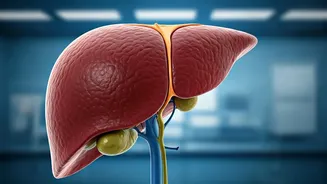Initial Metabolic Shift
When a person embarks on a 36-hour fast, the body undergoes a series of metabolic adjustments. Initially, the body relies on readily available glucose
from food and glycogen stored in the liver and muscles for energy. However, once these reserves are depleted, typically within the first 12-24 hours, the body switches to using stored fat for fuel. This process, known as ketogenesis, leads to the production of ketones, which the brain can use as an alternative energy source. The neurosurgeon's insights highlight this transition, explaining how the body adapts to burning fat for energy during the fasting period. Moreover, hormones like insulin decrease, and glucagon increases, further promoting fat burning and glucose production from the liver. This complex interplay of metabolic processes is crucial for understanding the body's response to fasting.
Cellular Repair Processes
Beyond metabolic shifts, a 36-hour fast can trigger cellular repair and rejuvenation mechanisms. Autophagy, a cellular 'housekeeping' process, is stimulated during fasting. In this process, the body clears out damaged cells and cellular components. This is beneficial for overall health and disease prevention. The neurosurgeon's perspective may illuminate how autophagy can affect brain health, as it is critical for clearing misfolded proteins that can contribute to neurodegenerative diseases. During fasting, growth hormone levels also tend to increase, which supports muscle maintenance and repair. In addition, the body's inflammatory response may be reduced, providing further advantages for long-term health. These cellular processes are pivotal in understanding the potential benefits of fasting.
Hydration and Electrolytes
Maintaining proper hydration and electrolyte balance is critical during a 36-hour fast. Because the body may lose fluids due to metabolic changes and reduced food intake, it's essential to drink enough water throughout the day. Electrolytes like sodium, potassium, and magnesium can be depleted during fasting, leading to symptoms like fatigue, headaches, and muscle cramps. While the neurosurgeon's specific recommendations might be lacking, generally, supplementing with electrolytes or consuming electrolyte-rich foods can help mitigate these effects. It's also important to note that individual responses vary, and monitoring one's body for any adverse symptoms is very important.
Potential Health Implications
Fasting, including a 36-hour fast, can have several potential health implications. Some studies suggest that intermittent fasting may improve insulin sensitivity, contributing to better blood sugar control and a reduced risk of type 2 diabetes. Furthermore, fasting has been linked to potential improvements in heart health by lowering blood pressure and reducing cholesterol levels. The neurosurgeon might shed light on how fasting could benefit the brain. It's crucial to consult a healthcare professional before making any significant dietary changes. This is vital if you have any existing health conditions, such as diabetes or eating disorders.
Breaking the Fast
How you break a 36-hour fast is as important as the fast itself. Refeeding should be done carefully to avoid digestive discomfort or other adverse effects. It's generally recommended to start with light, easily digestible foods, like small portions of vegetables, broth-based soups, or lean protein. Avoid consuming large meals or processed foods immediately after fasting. Slowly reintroducing regular meals helps the body readjust to processing food and prevents any unnecessary strain on the digestive system. The neurosurgeon may also offer advice on reintroducing nutrients that support brain health.



















